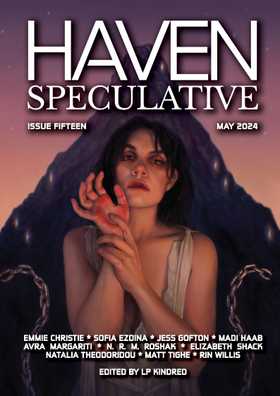FICTION
Ten Ways of Looking at Snow, Reflected Off an Obsidian Armor
by Avra Margariti in Issue Fifteen, May 2024
1.
You were cruel when we first met.
It would have been easy to claim I was sleepwalking, under your compulsion. But the truth was, I sought you out that midwinter night, in my spiderweb-flimsy nightgown and bruised, bare feet, chasing after a woodland vista I was taught through catechisms and beatings always to avoid. I left my bed in the smallest of hours despite parents and priests cautioning I stay away from the Erl-Queen's territory.
You were cruel, but you were honest too, unlike the honey-concealed callousness of my family and villagefolk. Wrapped in obsidian armor, you inspected me through the tenebrous gaps of your visor and said in a crushed-velvet voice, "My horse will cross this part of the woods once, and only once. It matters not to me if you join me or not."
My breath expelled hoary halos while, all around us, bristly snowflakes fell. They landed like cigarette burns on my traitorous tongue.
You were a child-thief, a child-killer, though I was a child no longer. When you offered me your frosted, gauntleted hand, I took it. It burned my bare fingers nearly to the bone.
I did not cry, not then. Only climbed behind you on your mare of night
and snow.
2.
We galloped bareback past brambles and blackthorn, fronds frozen stiff and brittle. The winter wind drew moisture to my eyes, each gust a toothed kiss. My tears formed lilliputian stalactites hanging off my eyelashes, the dampness of my nasal lining.
"What do you need from me?" I asked near the void where your ear might have been under the full-bodied armor of volcanic glass.
I imagined you ruled over a palace made of sculpted ice I would have to clean and chisel every day, teeth chattering, lips turning the blue of asphyxiated babies. Still, it would have been an improvement on my prior circumstances.
You grunted deep in your chest plate, for you did not understand the question, the need a primordial being such as you might have. Might name.
So I tried again: "What will you take from me?"
"Ten years of your life," you said, as we rode through the root-obstacled forest, and frozen pine needles made bloody lacework of my cheeks. You noticed and gave me a scarlet-stained ermine to wrap around my body. It smelled like chthonic things and ancient ice deposits. Soaked through the pelt were the pheromones of the hunt.
I should have asked sooner after the price of your boon. But my family never taught me to barter with the otherworldly creatures of the woods. Later, I would find out that, just this once, you had allowed yourself to be selfish, on top of cruel. Then again, so was I. Because the prospect of saying no to you, returning to a life unlived, was too terrible to contemplate.
(You would teach me, many winters later, why one does not agree to a contract one cannot read.)
"Will you keep me as your wife?" I asked, and was that dread or hope wing-beating in my chest?
Iron-shod hooves displaced snow as we rode on. The snow was thicker than mounds of salt tossed behind closed doors, barring winter witches from entry. Yet when I left home past midnight, the seal let me out, salt disturbed by the opening of the rust-hinged door.
You rumbled a sound through the visor, disgruntled. Was there flesh behind the armor, or only bone? Only ice?
"Your duties to me will be that of a traveling companion."
I had never traveled anywhere outside the borders of my tiny village. The thought of several worlds sprawling before me, gelid and pristine, was like a sip of stolen church wine, or a kiss stolen off the priest's daughter.
Terrifying; intoxicating.
3.
During our first winter together, you asked me to build myself an armor. We stopped at a thicket, where the understory slept in sharp dormancy and the membrane between worlds was as thin as the wings of a damselfly. Equine breath steamed the nocturnal air, lathering it in hoary plumes.
I blinked and, as above, so below, the thicket had now shifted to its subterranean counterpart: green gone black, wind gone stale.
It soon became apparent we weren't alone.
"What are they doing?" I asked you over the clang of metal and splintering of wood. We watched from a safe distance as the hobgoblins swung their axes against the Great Tree, its trunk bigger than my family's hut, vanishing through the great stone ceiling above. So hard the kallikantzaroi worked that their furry limbs sweated; so cold it was that their perspiration crystallized like opals across their dark coats, strung itself like gem garlands between their horns.
"They are the denizens of the underworld," you replied, "and they spend all year long trying to fell the tree that keeps the world below and the world above from meeting."
"Do they ever succeed?" I asked. I wouldn't have minded the worlds falling apart before this winter. But now, I couldn't abide it. Not when I had promised you ten winters of my life.
"No. When the Tree is mere seconds away from collapse, the kallikantzaroi are compelled to leave their den and wander the earth for the twelve days to the Epiphany. They steal the food left to cool on windowsills and terrorize the humans, cackling as they run from the burn of the priests' holy water. That is when the doorway is left hanging open." You looked at me, anticipatory. When had I learned to read your emotions through the obsidian armor? "That is when the creatures' forge gapes empty. And that is where you build your armor."
True to your words, the chthonic dwellers crawled and bounded toward their mass exodus, the Great Tree hanging on by a thread of bark with an iron will.
Your mare galloped through underground passageways of sulfur and fire and glimmery onyx stone. There were scars in the walls and water trickling like rusted windchimes from an unseen distance.
We reached a cave-like structure—a forge.
"Your armor is no trivial matter," you told me, voice tinny yet steadfast through your visor. "It is the only thing that will keep you safe from the bite of snow and wind during our travels."
"What about you?" I asked. "Are you ever warm?"
You hesitated. "That's not what I said. Safety does not always equal warmth."
I thought about it as I toiled away in the forge, melting infernal metal and reshaping it into the approximation of an armor. Several times I burned my fingers, only my own spit to cool them down. My muscles strained; I sweated and struggled. And soon, I beheld my own obsidian armor slowly take form.
You watched unrelentingly but did not offer to help.
I thought about your words. How, you weren't warm, but so far, you
were the safest thing I knew.
4.
I believe it was when we joined the Wild Hunt that I first realized.
"You save the children," I said, an ebullience raking across my ribcage—just because it was a welcome awareness, didn't mean there was no pain. "It's what you do, isn't it? Despite the legends warning of the contrary."
I was far from a child when I was taken by you—when I gave myself to you. Yet, through the short winter days and longer nights, you had protected me all the same.
You were looking off into the rime-veiled distance, saddled in melancholy like a panting horse. "Perhaps."
"Were you ever a child too?" I asked, reaching out for your burning armor. I never knew when you would flinch away or allow the skinless contact.
"There is frost settled over my heart," you said, as if that was answer enough. Eventually, your body unraveled itself. I leaned my cheek against your armor of frost and bite, and it burned the outer layers of my epidermis, rendered me brand new. And underneath my own armor, I felt frost settle, too. Just because it hurt, didn't mean it wasn't welcome.
By then, the Hunt was well underway, a trumpet heralding the Fae Queen's fleet of poison-dart frogs, gigantic centipedes, scintillating dragonflies, and black-coated moles. Pixies rode on each animal, brandishing weapons and war cries.
We rode too through the white-clad forest on your midnight mare, and I held tight to your rigid-dressed body, with the face always hidden from me—if there was one such face underneath. Yet I still saw you. I was beginning to shed my own veil of village preconceptions as well.
We rode with the Queen and her undead cavalcade, her howling fae, the yearly, righteous blood-hunger.
There were children running through the brush: human or half-deities or other rejects, struggling to catch up to their uncaringly fleeing parents. Those children got lost in fern and ford, tripped by saphenous veins and roots, like the forest, too, was alive and hungering. They were the children of wrongdoers in the resinous eyes of the forest, and they were collateral damage, scapegoats abandoned in their craven parents' stead.
I saw how a wave of your gunmetal-gray gauntlet redirected poison arrows, thrown stones, fae blasts of magic. Even as you reveled in the pursuit, the hunting of the deserving, you made sure their children were spared, hidden away in tree hollows turned abditories—secret places where precious things are kept.
When the fair folk caught the adult humans that had tried to hurt the folk first—headhunters selling severed fairy wings, pixie dust, and bottled banshee wails in the black market—you let their blood shed, crimsoning the white snow's crimped edges.
The Wild Hunt ululated. The blood painted your armor darker, a vermillion veneer keeping you—us—safe from stray arrows and triumph-volatile spells. You turned to me and your metallic finger rimed a rune of protection against my forehead, too.
The Wild Hunt raged on now that justice had been dealt. But the children of the sinners were safe.
It made me wonder where you'd come from. If it was from a place as bad
as mine. If all children were doomed to become either riders or prey.
5.
What did we survive on, those ten long years?
Berries red and purple as the bruises and cuts once placed upon my body, now bursting tart and sweet upon my tongue.
Fragrant tea made of pine needles boiled over the fire, the frost upon them twirling in my cauldron like a thing sublimated, given grander purpose.
The meat of the squirrel and pheasant, and more protein still from speckled quail eggs. I prayed thanks to each creature that fed me with the labor of its flesh.
"Won't you eat?" I asked you. My armor, though it shared your obsidian plating, did not have a visor to occlude me from the world. You could see my face plain as dawn, but still you hid from me behind your visor. Were you an ugly or a beautiful woman? Were you a woman at all?
But perhaps those questions beaten into me by my village bore no significance to our reality.
"Seeing you eat is enough to sustain me," you eventually replied.
Not for the first time, I wondered: was yours a true lack of need, or leftover ascetism from your own past?
Then, one fog-wreathed winter, we passed through a town feast, everything ornamented in green and red. Everything smelling of fir and spice.
The town people were waiting for the green knight's arrival. When you rode into the square in your obsidian armor, and I, your companion in my thinner, lighter coverings, the people immediately laid mulled wine and anise bread upon our feet.
You were reluctant to join the festivities of lute music and folk dancing, but we watched from the distance, as our mare drunk her fill from a trough of meltwater.
Out the corner of my eye I watched you shove a bite of flaky bread through your visor and sigh as if in memory of yeast and warmth.
I watched the village girls giggle and dance arm in arm, and I sidled closer to you, close enough for our armors to touch.
You let me.
6.
We measured the passage of time in winters. Ten, as many as I had promised you, back when I didn't know better (and I didn't want to learn, either). Oh blackbirds, don't ask me to recount the springs and summers. When you got fatigued enough to feel your ageless years hammering against your armor. When your frost refused to yield to the sun's glare. When I had to shield my aching eyes and lead the horse through the forest as you slumbered against me. And through each meadow we crossed, we scattered the dewdrops of molten snow the thirsty earth craved; we brought the icicles to combat the spiderwebbed-dirt drought. When I hid your glacial body in abandoned animal burrows, hoping to gift you elusive rest, I did not lift your visor, even though I could have. I gulped down my curiosity and did not peek at whatever sluggish darkness eddied underneath.
The people rejoiced in the secret rain they couldn't have known was our doing. Once, I witnessed thirsty children playing in the puddles our hoof-prints had summoned forth, watched them drink and swim and splash each other. Laughing.
You were needed, was the thing.
You were a needed thing.
I was a needy thing.
But each summer brought forth the hibernation. And each winter meant
our time together was galloping closer to its completion.
7.
Another chapped-lipped winter, we rode to a village where all the children had disappeared overnight. Their parents cried and accused us of stealing them away for our nefarious purposes. They sharpened their rakes and other metal implements, but those angry adults never turned their probing gazes inward. Never looked headlong at the abuse they had doled out, the backbreaking work of little fingers in frigid fields, the marrying the children off too young or sending them away to become parapaidia—little more than servants for the families of the rich.
You were angry, too. Your breath lathered the night white like a raging horse's coat. You swiped your gauntlet, trembling, and chips of glaucous ice hurtled through the air to lodge into the villagers' eyes. I admit—I flinched then. Something about that village awakening murky memories of my own.
The adults cried as the ice showed them a parade of their wrongdoings, the reasons why all their children had chosen to run away as one body, one beast.
While the village rioted, we bedded down in an abandoned stable over musky hay. Our mare warmed us with her candescent breath. We huddled close, armor to obsidian armor, while the villagers screamed and lamented their untended hearths and fields. In the young hours of morning, I sent out my listless consciousness until I found the missing children.
They were deep underground, small seeds warmed by the earth's igneous
core, huddled together like you and I were among the hay. The children
sighed in warm and content dreams, biding their time until they were
all grown, ready to send out shoots and crawl back into the anemic
winter light.
8.
The snow kept falling. In our cave of animal furs and bones, I told you, "You keep running away from me."
Our bed was cold when you were there, colder when you were not. And lately, more and more, I would wake up to find the indentation of your armored body in the ermines, the ivory pelt smelling of pine needles and absence like an abscessed tooth.
Perhaps we shouldn't have laid together. My parents would have told us that it's sin, had I not left them behind many winters ago. Another soul might say I was too young for you; me, traversing my third decade on this earth; you, ancient as silica cooling into an obsidian bed.
I was your charge and you, my savior.
No matter. When we fucked, my fist disappeared inside your chest plate, sinking into some frigid lake underneath, where your earthly body should have been. My fingers perforated the ice, then kept going. Tentacles of torpor-languid beasts caressed me in return. Great blackbird beaks nibbled at me from inside your core.
I brushed against your heart once. I don't care what you claimed about being only ever cold—that muscle pulsed lava-hot against my curled knuckles.
I was inside you more and more lately, hoping to soothe your restless wanderings; how each time, you would look at the white-toothed mouth of our cave and beyond with something like duty, like longing. The embers sizzled in our firepit. The substance behind your visor did, too.
"Stay!" I bellowed, the command echoing through our cave like animal-speak.
But you had already disappeared with a cool gust of wind, like a sigh.
9.
"Erl-Queen, make another covenant with me," I raged, I begged, I cajoled. You shook your head, and weak winter sunlight refracted off primordial ice deposits in prismatic regret. It felt like my burning eyes would never recover from you.
So I launched myself into hunter traps like a rabbit, just so you could save me and treat my suppurating wounds. I wanted to tie you to me beyond our twain fistfuls of winters. I thought about breaking the contract, abandoning you first so I wouldn't be the one left behind.
You were cruel, but then so was I.
I took a blade of ice to your throat. A last resort. My hot tears steamed in the space between us when they hit your impenetrable neck armor.
Another decade. Another boon. Please.
But again you sadly shook your head no, no.
That was what I got for being too desperate to ask sooner after the
rules of our agreement. How a traveling companion could only make a
deal once.
10.
In our tenth winter together, I wake up alone by the frozen pond where we went to sleep under a blanket of ferns, a canopy of molten stars.
I look all around the white stillness, but you are not there beside me. Your armor, too, is missing. When I lean over the mirrored pond, my obsidian chest plate glints darkly, the armor's visor having slid shut, then fused over my face during the frostbitten night. My head is haloed by a crown of icicles, its reflection shimmering in the polished water.
A blackbird caws, slicing through the pallid dreamscape, to land upon the black mare waiting for me with her breath foaming the dawn.
I place a final kiss upon my reflection, then climb onto my mare of night and snow the way I first did ten winters ago.
Together, we ride through the woods, and each land we cross, we cross only once.
© 2024 Avra Margariti
Avra Margariti
Avra Margariti is a queer author, Greek sea monster, and Rhysling-nominated poet with a fondness for the dark and the darling. Avra’s work haunts publications such as Strange Horizons, The Deadlands, F&SF, Podcastle, Asimov's, Vastarien, and Reckoning. The Saint of Witches, Avra’s debut collection of horror poetry, is available from Weasel Press. You can find Avra on twitter (@avramargariti).





